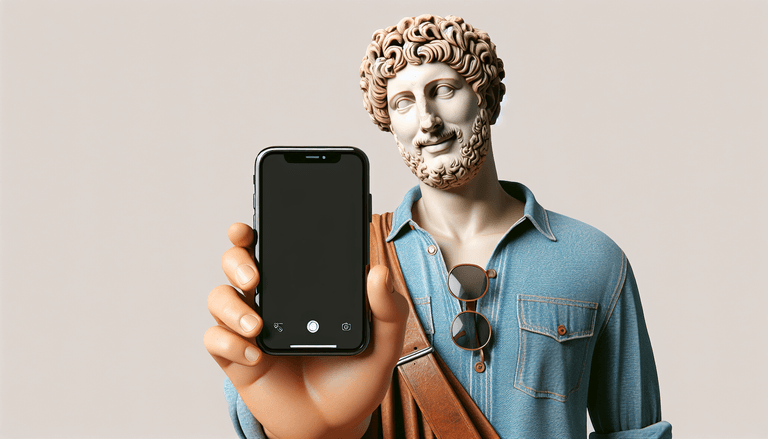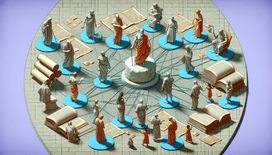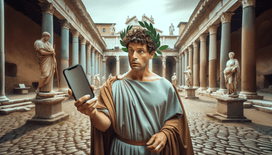In the grand tapestry of history, Julius Caesar’s crossing of the Rubicon in 49 BC stands out as one of those world-altering events, an act of defiance that led to the rise of the Roman Empire as we know it today. But what if, somewhere along that fateful journey, Caesar had stumbled upon a smartphone with Snapchat installed? I mean, the man could barely keep "the die is cast" to himself, imagine if he’d had filters to play with and ephemeral messages to send? Join me, Timewarp Terry, as we snap into this alternate reality and explore the pontificus impacts of Caesar going digital.
Snaps, Scrolls, and Senate Shenanigans
Picture the scene: the banks of the Rubicon river, mist swirling in the early morning light, Caesar poised at the brink of destiny. He pulls out his phone, spends a brief yet dedicated few minutes examining filter options, would camera-shy Brutus prefer dog ears or a flower crown? Then, in a move fit for history (and social media), Caesar selects the perfect lens. Perhaps he needs that extra "Golden Emperor Glow" or the "Senate Slay" to capture his best side.
Instead of tossing the proverbial die, he snaps a pic with the caption, "Crossing Rubicon or just crossing the line? ☠️ #TheDieIsCast #YOLO". Cue the legions’ chatter and Senate's head scratching as these snaps appear instantaneously, baffling even the wisest oracles of Rome. Imagine the senate’s reaction, scrolling through snap stories, accidentally tapping through that eighteen-second insight into Imperial ambition. Do they protest or start giving virtual thumbs ups? My denarii's on a civil war fought with witty memes and well-timed boomerangs.
The Original Influencer
Now, Caesar wasn’t just any Julii family member, he was a man who knew the power of image. Even without modern technology's reaches, his likeness was as practiced as a thousand-year-old influencer's. It wasn't mere optics; the man lived for the "Insta-grandeur" of Roman culture, being changed and reshaped around heroic narratives and larger-than-life gestures.
Sharing his exploits through a judiciously curated story feed would revolutionise audience engagement. Parthian campaigns on your phone. Senate debates in one minute servings. Imagine Caesar lounging, toga draped tastefully, holding a glass of Falernian in a distracting countdown of "5️⃣, 4️⃣... Swipe up for Republic-ending antics!" The sheer boldness of presenting oneself, unbridled spirit in digital salon discussions, would move Roman public discourse from forum to phone.
Rome, the Test Case for Memes
The Roman Empire was lavish, excessive, beautifully social, and by the gods, apt for memes. Caesar effectively wielding Snapchat would lead to memetic warfare, the bountiful cultural fodder would inspire a blitz of bards and scribes turned social media managers. An entire generation awash in Picts compared to patricians and visuals of Augustus mix-taping "Ides of March" slights with sass.
Senatorial elders attempting filters would provide eternal sunshine, as statesmen debated policy captions with all the thumb-tweet ferocity of philosophers. Who knew a toga could support so many layers of irony? #TogaTuesday indeed!
The Fall of Privacy
In this intriguing historical twist, a double-edged sword emerges. On one hand, Caesar’s Snapchat presence becomes ubiquitous, every move subject to public scrutiny. On the other, whispers (gory ones at that) circulate amongst Rome's underbelly about the in-fighting brought on by digitalism.
Snaps getting through indecipherable Caesar ciphers, ultimately, these spurio-social messages lay more traps than the labyrinth of Crete itself. A nationwide network, stitched through memes and misinformation, becomes possible. A digital Senate game of telephone, where whispers grow into political dramas of Virgilian epic scope.
Concluding Caesar’s Clicks
Caesar may have had the forethought to burn the bridges behind him at the Rubicon, but could he escape the echoing digital caverns of fleeting snaps? Every emoji, every glitchy group chat could lead to victory, a footnote in history or new primer for digital discourses?
This thought experiment, though loony-tuned through time, beckons examination of not just how tech changes tales, but how it re-weaves the fabric of their legacies. In our click-driven cultures, could the power of modern media turn the tide of democracy or twist it towards displays of pomp and circumstance? Can a single story really change the course of empire-past or present? Well, best snap it while it lasts, it might just disappear in eight seconds.







